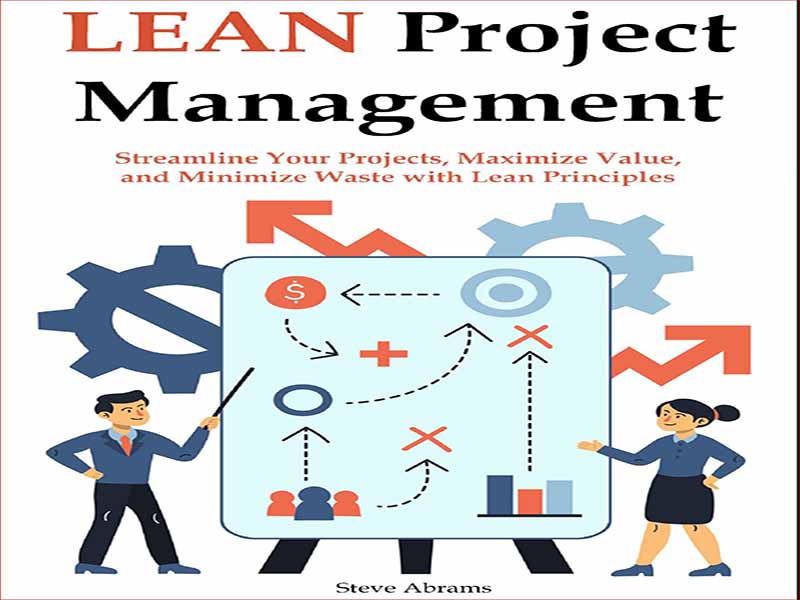- عنوان: Lean Project Management for Beginners
- نویسنده: Steve Abrams
- حوزه: مدیریت پروژه
- سال انتشار: 2024
- تعداد صفحه: 98
- زبان اصلی: انگلیسی
- نوع فایل: pdf
- حجم فایل: 4.21 مگابایت
Lean یک رویکرد سیستماتیک برای بهبود سازمانی است که بر کاهش ضایعات و افزایش ارزش برای مشتری نهایی تمرکز دارد. ریشه در شیوههای تولیدی که تویوتا در اواسط قرن بیستم توسعه داد – که اغلب به عنوان سیستم تولید تویوتا (TPS) نامیده میشود – از آن زمان تاکنون از صنایع فراتر رفته و در مراقبتهای بهداشتی، توسعه نرمافزار، بخشهای خدماتی و فراتر از آن کاربرد پیدا کردهاند.
ایده اصلی Lean این است که ارزش مشتری را به حداکثر برساند و در عین حال ضایعات را به حداقل برساند یا هر چیزی که از دیدگاه مشتری به ارزش اضافه نمی کند. در تفکر Lean، ارزش صرفاً با نیازهای مشتری تعریف می شود و هدف تولید محصولات و خدماتی است که با کمترین منابع ممکن این نیازها را برآورده کند. این نه تنها کارایی را بهبود می بخشد و هزینه ها را کاهش می دهد، بلکه کیفیت محصولات و خدمات ارائه شده را نیز افزایش می دهد.
روش ناب هفت نوع ضایعاتی را شناسایی می کند که باید حذف شوند که معمولاً با نام اختصاری TIMWOOD به یاد می آیند: حمل و نقل، موجودی، حرکت، انتظار، تولید بیش از حد، پردازش بیش از حد، و نقص. با تمرکز بر این حوزهها، سازمانها میتوانند عملیات را سادهسازی کنند، بهرهوری را بهبود بخشند و محیط کاری بهتری را ایجاد کنند.
پیاده سازی Lean شامل شیوه های بهبود مستمر (کایزن)، احترام به افرادی است که از طریق کار خود ارزش افزوده می کنند، و طراحی فرآیند بهتری با هدف صاف کردن جریان عملیات و مشتری مداری. ابزارهای ناب مانند Value Stream Mapping، 5S، Kanban و سایرین برای تجسم فرآیندها، حفظ سازمان، اطمینان از جریان مداوم و کشش از طریق سیستم، و در نتیجه، ارائه محصولات در زمان مورد نیاز استفاده می شوند.
تفکر Lean فرهنگی را تشویق می کند که در آن کارکنان در همه سطوح در پیشنهاد و اجرای بهبودها مشارکت دارند. این محیط مشارکتی نه تنها تعامل و رضایت شغلی را افزایش می دهد، بلکه منجر به ایده ها و راه حل های نوآورانه ای می شود که سازمان را به جلو می برد. به طور کلی، Lean در مورد ایجاد ارزش بیشتر با منابع کمتر، همسو کردن هر فرآیند با اهداف مشتری و ایجاد یک سازمان پایدار و سازگار است.
Lean is a systematic approach to organizational improvement that focuses on reducing waste and enhancing value for the end customer. Rooted in the manufacturing practices developed by Toyota in the mid-20th century—often referred to as the Toyota Production System (TPS)—Lean principles have since transcended industries, finding application in healthcare, software development, service sectors, and beyond.
The core idea of Lean is to maximize customer value while minimizing waste, or anything that does not add value from the customer’s perspective. In Lean thinking, value is defined purely by customer needs, and the goal is to produce products and services that meet those needs with the least amount of resources possible. This not only improves efficiency and decreases costs but also boosts the quality of the products and services delivered.
Lean methodology identifies seven types of waste to be eliminated, commonly remembered by the acronym TIMWOOD: Transport, Inventory, Motion, Waiting, Overproduction, Over-processing, and Defects. By focusing on these areas, organizations can streamline operations, improve productivity, and foster a better working environment.
Implementing Lean involves continuous improvement practices (kaizen), respect for people who add value through their work, and better process design aimed at making the flow of operations smooth and customer-focused. Lean tools like Value Stream Mapping, 5S, Kanban, and others are employed to visualize processes, maintain organization, ensure continuous flow and pull through the system, and as a result, deliver products just in time as they are needed.
Lean thinking encourages a culture where employees at all levels are involved in suggesting and implementing improvements. This collaborative environment not only increases engagement and job satisfaction but also leads to innovative ideas and solutions that drive the organization forward. Overall, Lean is about creating more value with fewer resources, aligning every process with the goals of the customer, and building a sustainable, adaptable organization.
این کتاب را میتوانید بصورت رایگان از لینک زیر دانلود نمایید.
Download: Lean Project Management for Beginners


































نظرات کاربران